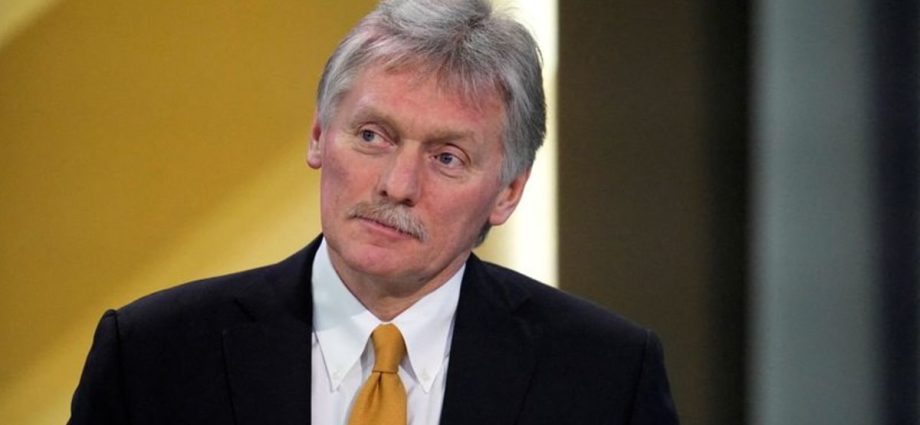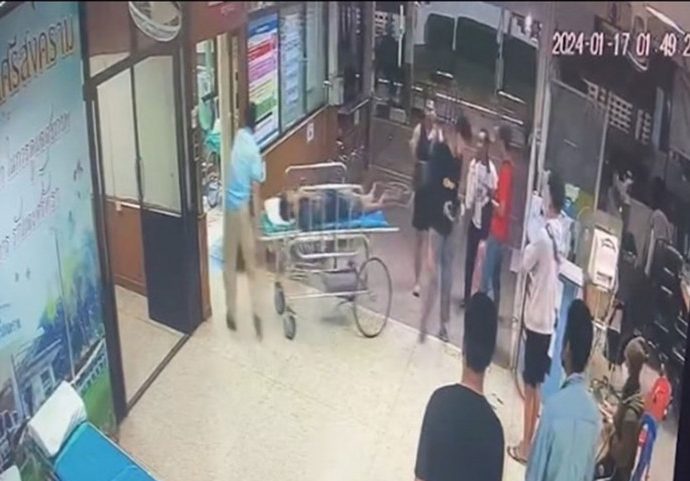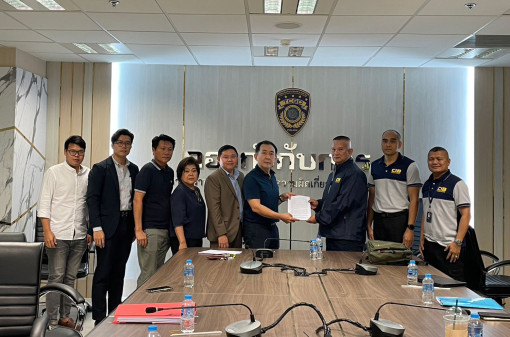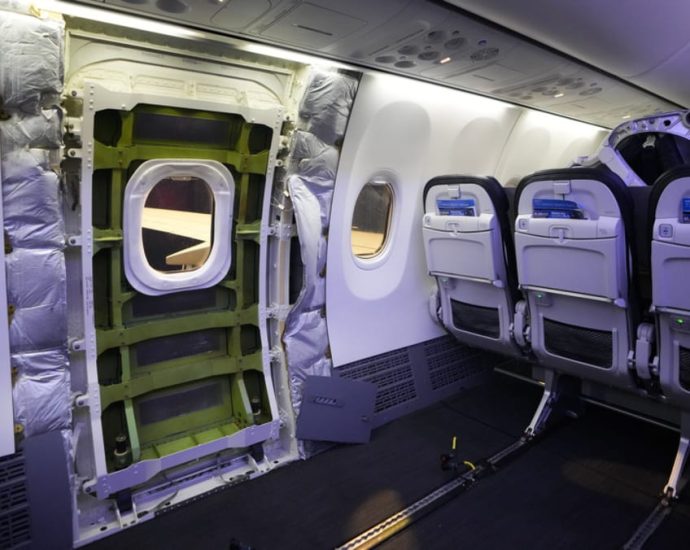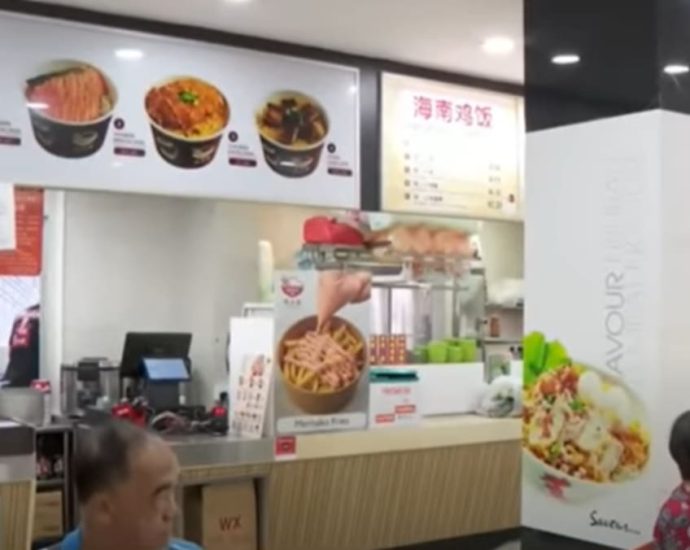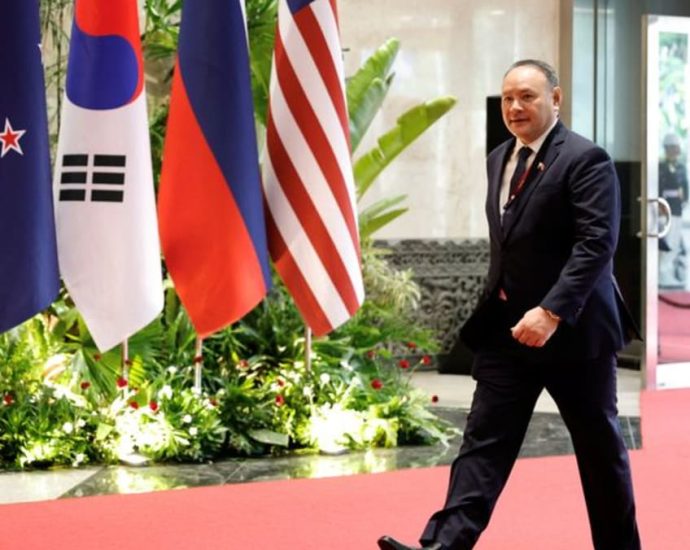Kremlin says it regrets Argentina’s decision not to join BRICS, hopes it reconsiders
MOSCOW: The Kremlin said on Friday (Jan 19) it regretted Argentina’s decision not to join the BRICS bloc of nations and hoped that Buenos Aires would reconsider. Argentina’s incoming Foreign Minister Diana Mondino said in November that his country would not join the BRICS grouping of developing nations despite beingContinue Reading
Seven youths held in knife attack on stranger
Border patrol officer rescues victim from gang aged 11-20 in Nakhon Phanom
PUBLISHED : 19 Jan 2024 at 18:19

NAKHON PHANOM: Seven young people, including a boy aged 11, have been arrested for a knife attack on a 20-year-old motorcycle passenger in Sri Songkhram district. The victim survived after a border patrol police officer came to his rescue.
Withoon Wong-ai, a resident of Sri Songkhram, was badly hurt in the attack in the early hours of Wednesday while his elder brother, who was driving the bike, managed to escape.
The incident happened about 1.30am on Wednesday as the two brothers rode past a local road and encountered seven young people on three motorcycles. The attackers, armed with knives, gave chase to the two men, who abandoned their bike and ran for their own safety.
Withoon ran into a blind alley and was set upon by the armed youths. Fortunately, Pol Sgt Kittichai Yothee, 32, attached to the 237th Border Patrol Police Company, was in his home nearby and heard a voice crying for help. He shouted at the attackers who fled immediately, then rushed to help bring the victim to Sri Songkhram Hospital.
Officers from the Sri Songkhram police station reviewed closed-circuit video from the attack scene and nearby areas for clues about the attackers.
On Thursday, all seven attackers, who lived in tambon Na Kham, were summoned to hear charges. They were aged 11-20 years old.
During questioning, the suspects confessed they had acted impetuously and wanted to show that they wielded influence in the area, said police.
The officers initially pressed charges of assault causing serious injury against the seven. The officers are awaiting a doctor’s medical opinion on the treatment of the victim before pressing more charges.
The 21-year-old victim said he and his brother had been working in Bangkok and returned home before the New Year holiday. They had not returned to work because they wanted to find jobs near their community.
On the night of the attack, Mr Withoon said, he and his brother had gone out to top up their mobile phones when the attackers on three motorcycles suddenly came upon them.
“At the blind alley, I could not flee. I kept begging them to stop and begging for my life, but they didn’t stop,” said Mr Withoon. “Luckily, there were people living in the area. A border patrol police officer came to my rescue after he heard my voice shouting for help.”
He said he did not know the attackers and had never had any conflict with any of them.
Fuel sellers hit back at âcheatingâ video
PTT service station operators file police complaint over claims about customers being short-changed

Oil retailers under the PTT brand have filed a complaint with police against people who shared messages and a video online that accused them of selling fuel unfairly.
The case follows a controversy at a PTT station in Kaeng Khoi district of Saraburi, in which it was claimed that the law allows a seller to dispense oil at a slightly lower amount than what the buyer paid for.
The issue erupted last month after a customer posted a video that went viral online. It showed the fuel sold at the station fell short of the five litres the customer had purchased. He used a meter to measure the level and found the irregularity.
The station and the Department of Internal Trade at the Ministry of Commerce subsequently explained it was a “permissible error”, as the law allows the amount of fuel sold to be plus or minus 50 millilitres, or 1%, for every 5 litres.
The buyer was not satisfied with what he considered an unfair transaction.
It remains unknown whether the petrol station in question was run by PTT Oil and Retail Business Plc (OR) or an independent entrepreneur under the PTT brand.
OR has already clarified that a permissible error can occur in sales of liquid goods and it is internationally acceptable, said lawyer Monchai Jongkrairattnakul, who led a group of oil retailers to lodge the complaint with the police Central Investigation Bureau on Friday.
“Those online messages not only branded the oil sale as an unfair trade but also defamed OR and caused hatred towards the company,” he said, adding the messages and the video are still being shared on the internet.
Mr Monchai said fuel dispensers at PTT petrol stations are checked frequently by the authorities, so it is impossible for retailers to take advantage of customers.
OR president Suchart Ramarch said the fuel dispenser issue provided a “valuable lesson” to the company on ways to approach the problem.
He said a permissible error can occur during oil transport and sales, so management and an appropriate response to the problem are crucial to ensure fairness for both retailers and consumers.
Some petrol stations under the PTT brand reported that their sales dropped during the New Year holidays. They believed it resulted from the video.
A source at the Department of Energy Business, who requested anonymity, said tests must be carried out for different amounts of fuel sold, ranging from 20 to 50 litres, to see whether such permissible errors still occur or whether there are any other irregularities with the dispensers.
“We should not completely put the blame on the oil seller because of just one error in this case. That would not be fair to the petrol station,” he said.
However, an executive of an oil company who asked not to be named, said the possibility that a dispenser at the station in question was substandard should not be dismissed.
During inspections of 14,000 petrol stations conducted by the Department of Internal Trade between August and mid-December last year, officials found 281 dispensers at 34 stations failed to meet the legal standard, according to media reports.
At 19 stations, it was found that fuel was dispensed in amounts that exceeded or were below the permissible 1% error level.
Another local oil retailer, who also requested anonymity and declined to disclose his brand, said his stations had not faced problems resulting from selling fuel below the purchased amount.
“But this does not mean we will simply use this issue to win over our competitors,” he said.
The Ministry of Energy, meanwhile, has responded to the high public interest in the issue to say that it will amend a law to ensure consumers receive the exact amount of fuel that they pay for.
Longboats, lanterns among fast-fading traditional Thai art forms, as locals fight to preserve important part of culture

LONGBOATS NO LONGER DRAWING INTEREST
Among the waning crafts is the construction of longboats.
A traditional longboat seats 55 rowers and stretches about 50m in length, as long as an Olympic-sized swimming pool, and takes two months to build.
The environment in longboat factories are typically dusty, dirty and hot.
Mr Athipat Saisoong, 36, started Sam Ya Sung Lui Racing Longboat Construction Factory about 10 years ago.
Back then, he had developed an interest in wanting to keep the longboat tradition and craft alive, and decided to join the sector.
Japan’s ‘Moon Sniper’ attempts precision lunar landing
TOKYO: Japan’s “Moon Sniper” was set to touch down early on Saturday (Jan 20) on the lunar surface, one of myriad new missions on the back of renewed interest in Earth’s natural satellite. If its Smart Lander for Investigating Moon (SLIM) mission succeeds, Japan will be the fifth nation toContinue Reading
Who were Iran and Pakistan targeting in cross-border strikes, and will tensions spiral?

Iran and Pakistan traded strikes on each other’s territories this week, raising fears of greater turmoil in a region already grappling with instability and conflict.
Analysts said the escalation of hostilities between the neighbours is unprecedented, given the relatively cordial ties between Tehran and Islamabad.
However, the two nations share a history of tensions along their nearly 1,000km long volatile border, where they both face separatist threats.
WHAT HAPPENED?
On Tuesday (Jan 16), Iran launched missile and drone raids on Pakistan’s western Balochistan province, killing two children.
On Wednesday, nuclear-armed Pakistan recalled its ambassador from Iran and blocked Tehran’s envoy.
Islamabad called the attacks “a blatant breach of Pakistan’s sovereignty” and “a violation of international law”.
On Thursday, Pakistan retaliated with military strikes in Iran’s southeastern Sistan-Baluchistan province, with Tehran reporting a death toll of nine civilians.
WHO WERE THE TARGETS?
Iran said its Tuesday strike was aimed at the headquarters of Jaish al-Adl, an ethnic Baluch Sunni militant group which Tehran labels a terrorist outfit.
The group wants independence for Sistan-Baluchestan, and often targets Iranian security forces near the Pakistani border.
Pakistan said its Thursday raids targeted the Baloch Liberation Front (BLF), a militant group which has been fighting the government for decades for a separate Balochistan state.
Despite being Pakistan’s biggest province with rich gas and mineral resources, Balochistan has the smallest population and is the least economically developed.
Ethnic Baloch militants accuse Islamabad of neglect and exploitation, and heavy-handed treatment of those in the region.
IRAN-PAKISTAN RELATIONS
The border insurgencies have been a long-running source of tension between the neighbours, who accuse each other of harbouring separatists.
Iran has blamed Pakistan of allowing Jaish al-Adl militants to operate freely in Balochistan and using the area to launch attacks on Iranian forces.
However, observers said it is unusual for either side to carry out such attacks on each other’s soil.
“Both countries have in the past cooperated and shared intelligence to rein in attacks by such groups,” said Mr Ali Vaez, project director of Iran at the International Crisis Group, a Brussels-based think-tank that focuses on conflict reduction research.
“So, it’s quite unprecedented to see these kinds of cross-border strikes and tensions that have now escalated so quickly.”
Blown-out Boeing door plug was made in Malaysia, US authority to scrutinise supply chain
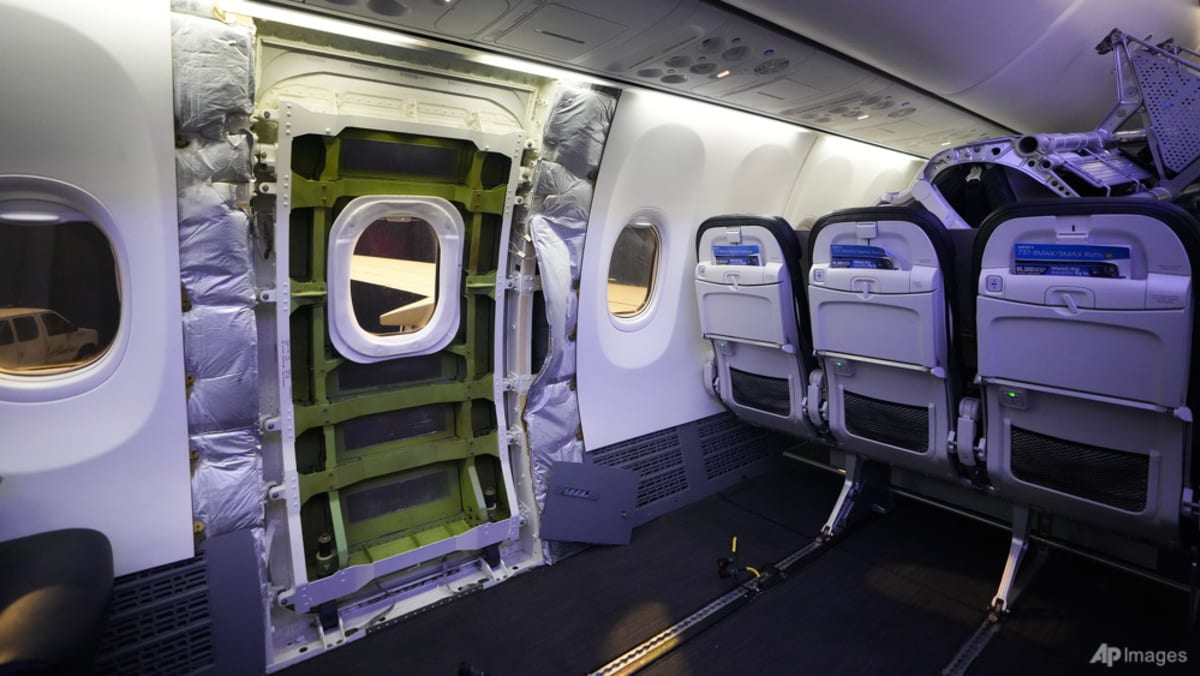
Boeing CEO Dave Calhoun visited Spirit’s production facilities in Wichita on Wednesday for an employee town hall alongside Spirit’s CEO, Pat Shanahan.
Speaking to about 270 factory workers, engineers and other employees, Shanahan said Spirit would “make changes and improvements” and “will restore confidence”.
Calhoun said, according to Boeing: “We’re going to get better, not because the two of us are talking, but because (of) the engineers at Boeing, the mechanics at Boeing, the inspectors at Boeing, the engineers at Spirit, the mechanics at Spirit, the inspectors at Spirit.”
The two executives answered several questions from employees, ranging from how lessons from the incident could influence future airplane designs, and whether Spirit and Boeing were united on a path forward, said a source in the room.
Boeing on Tuesday named retired US Navy Admiral Kirkland H Donald to advise the planemaker’s CEO on improving quality control.
Some stallholders in heartland coffee shops call it quits over high rent and costs
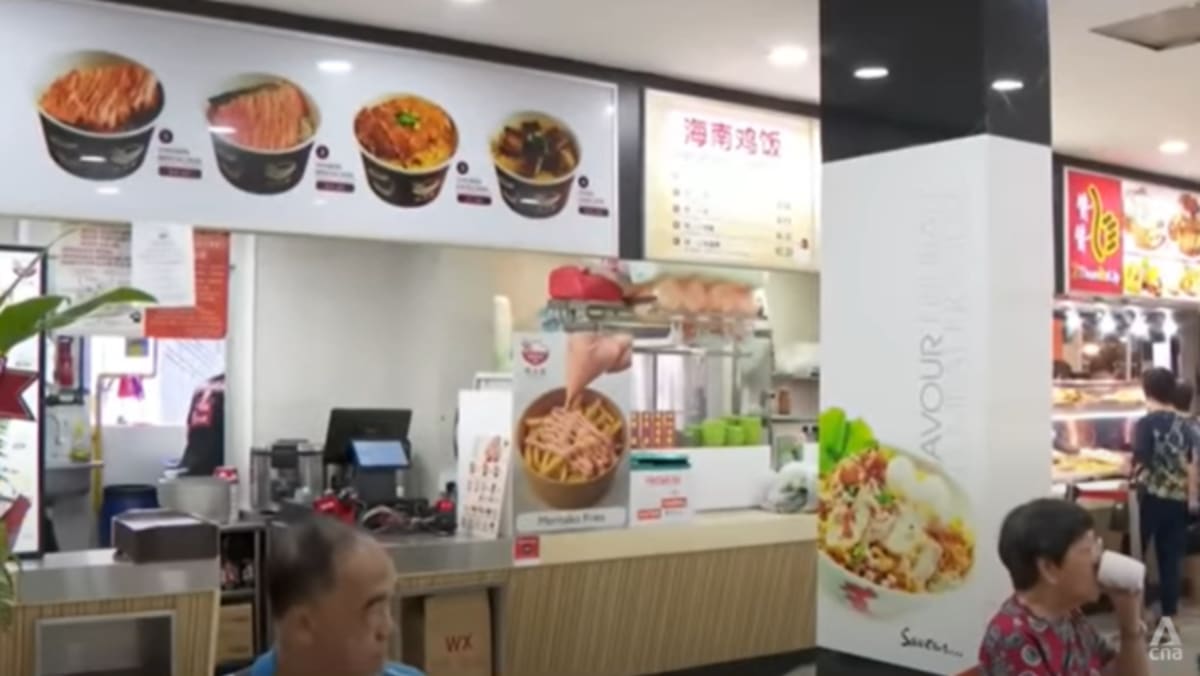
SINGAPORE: Higher rent and rising costs are forcing some stallholders to exit coffee shops in the heartlands.
Some stalls have tried to cope by passing on the costs to consumers and scrimping in other areas, but overheads remain high.
Japanese food stall chain Mentai-Ya is one such business affected by growing expenses. Last month, it shuttered two stalls in coffee shops in Clementi and Boon Keng.
Its owner Khoo Keat Hwee said rent at the Clementi outlet, situated at a prime location near the MRT station, has gone up by about 20 to 30 per cent since he set up shop there two years ago.
He did not reveal how much rent he was paying there, but said the price can go up to S$9,000 (US$6,700) per month for spaces at good locations.
“The stalls we closed were doing fine in terms of customers but with the rent increase, it won’t be sustainable as we would have to increase the price and lose customers in the process,” he said.
Aside from rental, other costs such as employee wages, ingredients, supplies and utilities have also gone up.
Last year, the price of salmon increased by about 25 to 30 per cent, said Mr Khoo. The fish is an integral ingredient for one of the stall signature dishes – the salmon mentai don.
This forced Mr Khoo to also increase the price of his dishes by S$1. However, he has lost at least 10 per cent of his patrons since then.
“Some of my customers, their kids love to eat salmon mentai but they say ‘Can you lower down your price a bit? We don’t come (so often anymore) because it’s expensive’,” he told CNA.
“It’s one of my biggest regrets (to raise prices) because a lot of people won’t be able to afford it. I’ve been finding ways to really make things affordable for the public.”
Mr Khoo said that should business expenses continue to rise, it would become harder to maintain the six more Mentai-Ya outlets in heartland coffee shops around the island.
Two branches are situated in Sengkang and Punggol, newer estates which command much higher rent than mature neighbourhoods.
He said none of his outlets are housed within coffee shops that were sold for record prices.
“My rental is (considered) normal, but this normal is really high cost,” he said.
Philippines, Canada sign agreement on defence cooperation
MANILA: The Philippines and Canada signed a memorandum of understanding on defence cooperation on Friday (Jan 19), a move which Manila’s defence minister said could later lead to a troop pact between the two countries. “I’m glad to hear that there is a strong intention on both sides to deepenContinue Reading
‘Easier to say no’: Public servants would rather decline gifts than go through declaration process

EASIER TO REJECT OUTRIGHT
Under Singapore’s public service rules on gifts, civil servants cannot retain gifts worth more than S$50 unless they pay the market value of the gift to the government, and if it does not affect the integrity of the civil service.
Public servants CNA spoke to – all of whom declined to be identified – said it was easier to decline presents outright to avoid complications.
One who used to work in a statutory board under the Ministry of Culture, Community & Youth said: “From past experience, it is easier to reject outright and let (donors) know that we are not able to receive these gifts.”
The public servant has returned gifts such as Chinese New Year and Christmas hampers on behalf of a superior.
The process to declare a gift involves filling in a form which asks who the donor is, what the gift is and for what occasion, she said. The form must then be submitted to the relevant department.
“From what I know, first thing we need to do is to politely decline,” she said, describing the process as a “best practice”.
In cases where she has “no choice” but to receive gifts, such as plaques from foreign dignitaries, these must also be declared and may then be displayed in the office.
A civil servant who joined the sector less than a year ago said that newcomers had to undergo a virtual course detailing what they can or cannot receive.
“(There are) too many details and I’ve got too much work to handle, so I think it’s easier to just say no,” the civil servant in his 30s said.
“I haven’t received any gifts personally, but seeing how onerous it is to declare gifts it’s better to just reject it outright. Best to play safe. (You) can’t run afoul of regulations if you say no.”
His team have been told to put perishable food items, such as biscuits and mooncakes, in the common pantry for sharing. “Please don’t give civil servants anything … it’s (very) troublesome,” he said.
Asked about his statutory board’s guidelines, another public servant said: “It’s very strict actually. Officers are prohibited from accepting gifts, in cash or kind. ‘Gift’ includes money, goods, services, passage or any form of benefit. The wording basically covers any form of gifts.”
“But if it is impractical or inappropriate to refuse the gift because of the context and circumstances, then the officer must report and declare,” the public servant in his 30s said.
Staff from the statutory board, which is under the Ministry of Education, are required to do a yearly declaration, refresher and quiz on the Code of Conduct, which covers potential conflicts of interest.
“To be on the safe side, one would strongly encourage any civil servant to reject all forms of gifts,” noted independent political observer Felix Tan, adding that this might come across as “draconian” or “pedantic”.
“I think what is important here is not whether they should stop all forms of receiving gifts or otherwise, because sometimes in the diplomatic circles, we do have exchange of gifts right? I think essentially it’s about declaring and accountability, and being honest and upfront about such gifts.”
Dr Tan stressed that a gift should never be a personal gift, but rather a gift given to the ministry.
CONTROLS FOR THE PRIVATE SECTOR
The private sector generally follows the same guidelines on receiving gifts.
The Singtel Group Code of Conduct, for example, prohibits the acceptance of gifts, hospitality events or invitations due to potential conflicts of interest.
Where it is difficult to reject a gift, the gift – unless a perishable or of a “token value” – must be declared to a supervisor and human resources (HRT). When in doubt, employees should declare, according to the Code of Conduct.
ST Engineering’s regulations state that gifts given or received must not be “excessive, inappropriate or inconsistent with customary practice”.
These presents must not influence or be perceived by others to influence any judgment or actions in the performance of official duties. They must also not place the recipient or the recipient’s company under any form of obligation or be susceptible of being construed as a bribe.
Institute for Human Resource Professionals Senior Professional Li Fengling said companies should be clear in setting the boundaries of accepting gifts, which include specifying the level of approval needed and the threshold of gift value.
“Documentation is a good way to promote and enhance transparency and governance. Companies can also conduct training and share communication about ethical behaviour to help foster a culture of integrity,” the head of human resource and admin said.
Asked if it was common practice for employees to reject gifts rather than accept and declare them, Ms Li said this depended on the value and stature of the gift.
“If it is priced at a high value, it is advisable to reject the gift, especially if it is intended only for a specific employee.
“Employees can avoid the perception of impropriety by consistently adhering to the company’s gift policy and maintaining transparency by declaring gifts when necessary and ensuring that accepting a gift does not influence their business decisions or actions,” she added.

